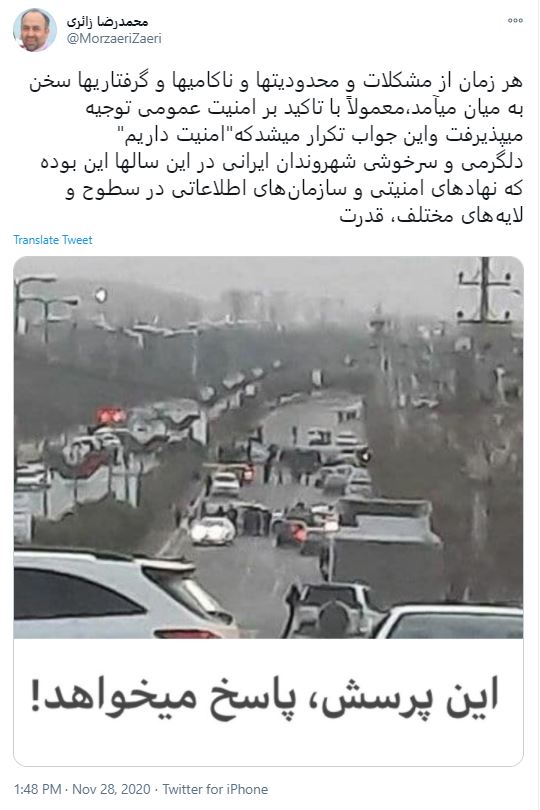On November 27, the Iranian government confirmed reports about the death of its prominent nuclear scientist Mohsen Fakhrizadeh. The Iranian coalition opposition National Council of Resistance of Iran (NCRI) previously revealed that he was in charge of Tehran’s efforts for obtaining nuclear weapons. “Fakhrizadeh was the father of Iran’s nuclear bomb-making projects,” according to the dissidents.
Fakhrizadeh’s death severely shocked political and military figures. In the wake of reports, conservative factions affiliated to the Supreme Leader Ali Khamenei and the Islamic Revolutionary Guards Corps vowed to take harsh revenge. “We will receive blows if we do not strike,” a piece on the November 28 edition Vatan-e Emruz read.
There is no evidence of who had killed Iran’s key person as of this report. As always, Iranian authorities laid blame on foreign governments. However, they have no proof, and despite their primary claims about the detention of an alleged assassin, the media later revealed that the government did not arrest anyone. Furthermore, the blue Nissan owner—which had exploded during the attack—had departed the country a month earlier.
On the other hand, Iranian authorities have been stuck in a difficult position. They cannot turn a blind eye to the event and indifference will extremely tarnish their stance not only inside the country but also among their proxies around the Middle East.
Also, Tehran cannot ignite a war for different reasons. First of all, in the past two years, the ayatollahs have dramatically lost their resources due to crippling U.S. sanctions. More importantly, they hopefully await the incoming U.S. administration to resume nuclear negotiations and any act of war may affect their counterparts’ enthusiasm for new talks. “The trap of tensions,” Arman-e Meli daily, affiliated to the ‘reformist’ faction, wrote on November 28.
These conditions sparked a new round of political rivalries in Iran. The November 29 Parliament (Majlis) session gave a sense of these rivalries. “Some of remarks and comments—either before or after the assassination [of Fakhrizadeh]—are rooted in this obvious point that appealing the enemy for negotiations contains this wrong message that Iran is weak. The enemies’ impression of a weak Iran will lead to more economic pressure and less security,” the official website of the Majlis (ICANA) quoted the Speaker Mohammad Bagher Ghalibaf as saying on November 29.
On the same day, members of the Majlis Energy Committee also announced that they would focus on:
– Ending cooperation with the International Atomic Energy Agency (IAEA)
– Withdrawing from the 2015 nuclear deal, formally known as the Joint Comprehensive Plan of Action (JCPOA)
– Expelling IAEA inspectors from the country
– Increasing uranium enrichment to 20 percent, which is far beyond the JCPOA limitations, which allowed the Iranian government to enriched up to 3.67 percent and stockpile only 300 kilograms.
Fakhrizadeh’s death also revealed the Iranian government’s failure in protecting its high-ranking profiles. Former Defense Minister and current military advisor to the supreme leader Hossein Dehghan, who is said to be Khamenei’s preferred candidate for the upcoming presidential election in June 2021, admitted to the state’s vulnerability.
“Some media reports and individuals’ remarks are because they are uninformed about the issue. Fakhrizadeh was completely protected, his protection was provided by high-ranking security teams, and he had [bulletproof] vehicles. However, this event took place… This [attack] was not the first and we previously experienced assaults on Imam Khomeini shrine or the Islamic Consultative Assembly [Majlis]. It is imperative to find from where this [security] breach has carried out?” TV Channel Five aired Dehghan’s remarks on November 28.
In a thread on Twitter, a figure close to Khamenei leaked regime loyalists’ concerns over the death of Fakhrizadeh and more significant issues that the government must deal with. Mohammad Reza Zaeri wrote:
“[In the past few years,] whenever we spoke about problems, restrictions, failures, and dilemmas, [Hassan Rouhani‘s administration] usually responded to us that ‘We have security.’ ‘Citizens’ were happy about the expertise of the country’s security institutions and intelligence organizations. However, were they uninformed [about the threat against Fakhrizadeh]?” Zaeri tweeted on November 28.

“Certainly, this question is prone to convincing answers, and relevant institutions can respond to it with precision and transparency. They should present the answers to public opinion, saving audiences from confusion and mayhem, and take back citizens’ valuable trust to the ruling system,” he added.
“In such sensitive circumstances, we must only trust in our people and not leave their questions unanswered. Otherwise, we will face daily decreases and erosion of the state’s social capital and public trust. In such a scenario, a disaster far greater than the lack of [Fakhrizadeh] awaits us,” Zaeri warned.